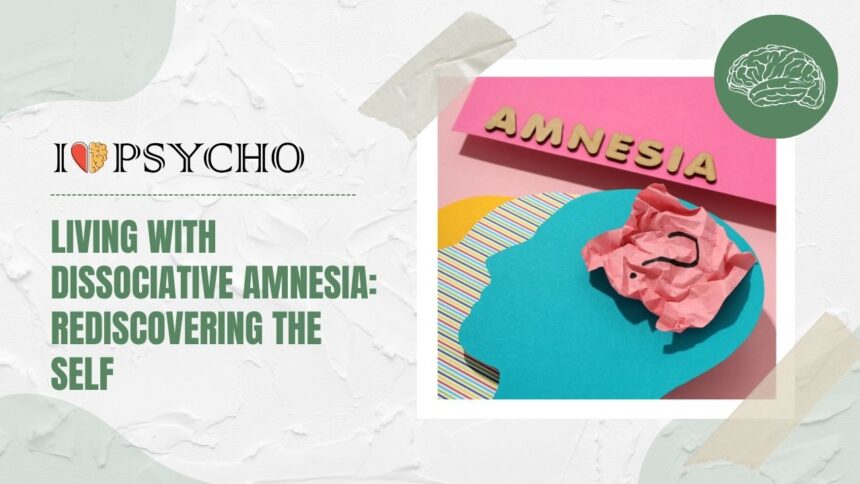Step into the world of dissociative amnesia where memories fade like whispers in the wind, leaving behind a fragmented sense of self. Imagine waking up one day not recognizing your own reflection or recalling moments that shaped your life. This mysterious condition shrouded in uncertainty can disrupt daily routines and strain relationships. Join us on a journey to unravel the complexities of living with dissociative amnesia, rediscovering lost pieces of identity, and embracing the path to healing and self-discovery.
What is Dissociative Amnesia?
Dissociative amnesia is a perplexing mental health condition characterized by memory loss that goes beyond typical forgetfulness. It’s like having a book with missing chapters, leaving gaps in one’s life narrative. Individuals may experience sudden onset memory lapses related to traumatic events or periods of extreme stress. These episodes can be selective, affecting specific memories, or generalized, blanketing entire chunks of time.
The brain’s way of protecting itself from overwhelming emotions can lead to dissociation, where memories are stored in a separate compartment unreachable by conscious recall. This disconnect between past experiences and present awareness can be disorienting and unsettling for those grappling with their sense of identity.
Understanding the complexities of dissociative amnesia involves peeling back layers of psychological defenses and delving into the intricate workings of memory storage and retrieval processes within the mind. By shedding light on this enigmatic condition, we aim to foster empathy and promote awareness about the challenges faced by individuals navigating the maze of forgotten memories.
Symptoms and Causes of Dissociative Amnesia
Dissociative amnesia can manifest in various ways, causing memory gaps and confusion. Individuals may struggle to recall important personal information or significant life events without any physical brain damage. The onset of dissociative amnesia is often linked to traumatic experiences that the mind seeks to protect itself from.
Symptoms may include sudden memory loss, disorientation, and a sense of detachment from oneself or surroundings. These episodes can be distressing and impact daily functioning. Causes are typically rooted in overwhelming stressors or traumatic events that trigger the mind’s defense mechanism.
Understanding the symptoms and causes of dissociative amnesia is crucial for early recognition and intervention. Seeking professional help and support can aid in navigating through this challenging condition. By shedding light on these aspects, we pave the way for greater awareness and empathy towards those experiencing dissociative amnesia.
The Impact on Daily Life and Relationships
Living with dissociative amnesia can have a profound impact on daily life and relationships. Imagine waking up one day not knowing who you are, where you’ve been, or why the people around you seem familiar yet distant. It creates a constant sense of disorientation and confusion that can be overwhelming.
Simple tasks like remembering appointments or important dates become challenging, leading to frustration and self-doubt. Relationships may suffer as loved ones struggle to understand the changes in behavior and memory lapses. Trust issues can arise when memories are inconsistent or missing altogether.
The emotional toll is significant, causing feelings of isolation and insecurity. It’s hard to feel connected to others when you’re unsure of your own identity. The fear of forgetting important moments or interactions looms large, impacting intimacy and closeness.
Navigating daily life becomes a delicate balance between trying to piece together fragments of memory while maintaining a sense of normalcy for those around you. The struggle is real, but with support and understanding, it’s possible to find ways to cope and adapt.
Treatment Options for Dissociative Amnesia
Treatment options for dissociative amnesia vary depending on the individual’s needs and circumstances. Therapy, such as cognitive-behavioral therapy (CBT) or dialectical behavior therapy (DBT), can help address underlying issues and improve coping mechanisms.
Medication may also be prescribed to manage symptoms like anxiety or depression that often coexist with dissociative amnesia. Additionally, eye movement desensitization and reprocessing (EMDR) therapy has shown promise in treating trauma-related memory disturbances.
In some cases, hypnosis or creative therapies like art or music therapy can aid in accessing repressed memories and promoting healing. It’s crucial for individuals to work closely with mental health professionals to tailor a treatment plan that suits their specific needs.
Support from loved ones and participation in support groups can also play a vital role in the recovery process, providing encouragement and understanding along the journey towards rediscovering one’s sense of self.
Coping Strategies and Support for Those Living with the Condition
Living with dissociative amnesia can be challenging, but there are coping strategies that can help individuals navigate their daily lives. One important technique is keeping a journal to track memories and triggers. This can provide insight into patterns and aid in memory recall.
Support from friends, family, or support groups is crucial in managing the condition. Connecting with others who understand what you’re going through can offer comfort and validation. It’s essential to communicate your needs and boundaries to those around you.
Practicing mindfulness and grounding techniques can also help bring focus back to the present moment during episodes of dissociation. Engaging in activities that promote relaxation, such as yoga or meditation, can be beneficial for overall well-being.
Seeking professional help from therapists experienced in treating dissociative disorders is key to developing personalized coping strategies. Remember, it’s okay to ask for help when needed—it shows strength and courage in facing this condition head-on.
Personal Stories and Insights from Individuals with Dissociative Amnesia
Living with dissociative amnesia can feel like navigating through a maze of forgotten memories and lost moments. For those who experience this condition, each day brings a mix of confusion and clarity as they piece together fragments of their identity.
Personal stories from individuals with dissociative amnesia shed light on the resilience and strength it takes to confront the unknown within oneself. Their insights offer a glimpse into the complexities of memory loss and the profound impact it has on one’s sense of self.
Through these narratives, we witness the courage it takes to embrace uncertainty and embark on a journey towards rediscovery. Each story is a testament to the human spirit’s capacity for adaptation and growth in the face of adversity.
In sharing their experiences, individuals with dissociative amnesia remind us of the power of vulnerability and authenticity in fostering connection and understanding. Their stories serve as beacons of hope for others grappling with similar challenges, showing that healing is possible through acceptance and support.
Finding Identity and Self-Awareness through Recovery
Navigating the journey of recovery from dissociative amnesia can be a profound experience of rediscovery. As memories start to resurface and fragments of the past come into focus, individuals may find themselves piecing together their identity like a puzzle. It’s a process of unraveling layers and uncovering truths about oneself that have long been buried beneath the surface.
Through therapy, self-reflection, and support from loved ones, those living with dissociative amnesia embark on a path towards self-awareness. It’s about learning to accept all parts of oneself – the forgotten memories, the suppressed emotions, and the complexities that make up who they are.
As awareness grows, so does empowerment. Finding identity through recovery is not just about remembering what was lost but also embracing who you are in this moment. It’s an opportunity for growth, healing, and ultimately reclaiming agency over one’s narrative.
Each step taken towards rediscovering the self is a triumph in itself – a testament to resilience and courage in the face of adversity.
Seeking Help: Therapy and Support Groups
Seeking help for dissociative amnesia can be a crucial step towards healing and recovery. Therapy provides a safe space to explore underlying issues contributing to memory loss and identity struggles. A skilled therapist can guide individuals in processing traumatic memories and building coping mechanisms.
Support groups offer a sense of community and understanding that can be invaluable on the journey towards self-discovery. Connecting with others who share similar experiences can reduce feelings of isolation and provide validation. Sharing stories, challenges, and successes within a supportive environment can foster resilience and growth.
It’s important to remember that seeking help is not a sign of weakness but rather an act of courage. It takes strength to acknowledge the need for support and take proactive steps towards regaining control over one’s life. Therapy and support groups offer tools, insights, and connections that can empower individuals to navigate their healing journey with compassion and resilience.
Rediscovering the Self: Healing and Moving Forward
After living with dissociative amnesia, the journey of rediscovering oneself can be both daunting and empowering. It’s about peeling back the layers of forgotten memories and fragmented identities to uncover the essence of who you truly are. Healing begins by acknowledging your past experiences without judgment or fear, allowing space for self-compassion and acceptance.
Moving forward involves embracing uncertainty while staying grounded in the present moment. By cultivating mindfulness and self-awareness, you can gradually piece together your sense of identity and reclaim agency over your narrative. Each step towards healing is an act of courage and resilience, a testament to your inner strength.
As you navigate this process, remember that growth often comes from discomfort. Embrace challenges as opportunities for growth rather than setbacks. Surround yourself with a supportive network who uplifts and encourages your journey towards self-discovery.
By honoring your truth and nurturing a sense of authenticity, you pave the way for profound transformation and newfound purpose in life. The path to rediscovering yourself is not linear but filled with twists, turns, and unexpected revelations that shape your evolution into a more wholehearted version of yourself.
Breaking the Stigma of Mental Health Conditions
Breaking the stigma surrounding mental health conditions is a crucial step towards creating a more inclusive and understanding society. It’s essential to educate ourselves and others about the realities of these conditions, fostering empathy and compassion instead of judgment. By sharing our stories and experiences openly, we can challenge stereotypes and misconceptions that often perpetuate stigma.
Acknowledging the prevalence of mental health issues helps normalize conversations around them, encouraging individuals to seek help without fear of being stigmatized. It’s important to remember that mental health conditions are not weaknesses but medical conditions that require support and treatment like any other illness.
Promoting acceptance and understanding can lead to increased awareness, access to resources, and ultimately better support for those struggling with their mental health. Let’s work together to break down barriers, advocate for change, and create a more supportive environment for everyone facing mental health challenges.
Conclusion
As we wrap up this exploration of living with dissociative amnesia, it’s essential to acknowledge the challenges and triumphs that come with this condition. The journey towards rediscovering the self is a profound one, filled with ups and downs, but ultimately offering hope for healing and growth.
By understanding the symptoms, causes, and impact of dissociative amnesia on daily life and relationships, individuals can begin to seek treatment options that work best for them. Whether through therapy, support groups, or coping strategies, there are paths towards regaining a sense of identity and self-awareness.
Personal stories from those who have experienced dissociative amnesia firsthand remind us of the resilience and strength within each individual. By breaking the stigma surrounding mental health conditions like dissociative amnesia, we create a more supportive environment for those seeking help and healing.
In closing, let us continue to foster empathy, understanding, and compassion for all individuals navigating their way through the complexities of mental health. Together, we can provide a safe space for those living with dissociative amnesia to rediscover themselves and move forward on their path towards recovery.









